Black Lives Matter: Pledges for change in Bristol after protest
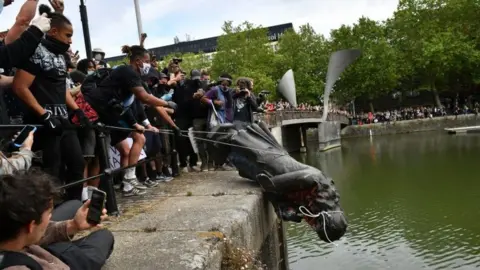 PA Media
PA MediaPledges have been made by police, the council and community leaders aimed at bringing about long-term change in Bristol following the Black Lives Matter protest that saw a statue of Edward Colston toppled.
Protesters tore down the statue of the 17th Century slave trader and pushed it into the city's harbour, in one of the most symbolic moments of a series of demonstrations around the country.
An estimated 10,000 people had gathered in Bristol to demonstrate last weekend and many said the events felt empowering but they hoped for real change in the city.
Bristol Mayor Marvin Rees has commissioned research into the city's history in a pledge to better understand its story, while other pledges made include updating the school curriculum and efforts to improve BAME representation within the police force.
The statue was recovered on Thursday morning from Bristol's harbour and is set to become a museum exhibit, alongside protestors' placards from the demonstration.
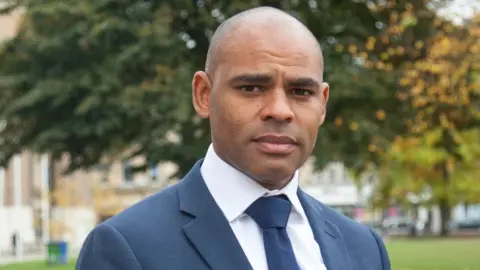 Bristol City Council
Bristol City CouncilMr Rees, Bristol's mayor since 2016, said: "The events over the last few days have really highlighted as a city we all have very different understandings of our past.
"The only way we can work together on our future is by learning the truth of our beginnings, embracing the facts, and sharing those stories with others.
"Bristol's journey to become the modern city it is today includes a history of huge disparities of class, race and gender and the struggles for equality."
Following many calls for schools' curriculums to better reflect the culture, literature and history of black communities, Joanne Jefferson, head of English and associate head teacher at St Katherine's School in Pill, Bristol, said the school would be leading on cultural awareness and inclusion in September.
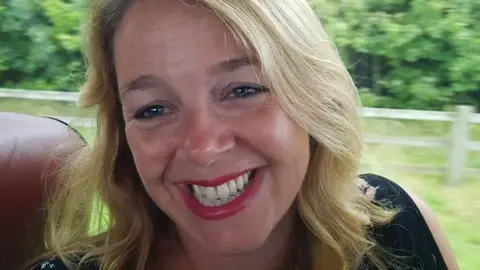 Joanne Jefferson
Joanne JeffersonShe said the protests had inspired the school to "evaluate everything" about its teaching.
"White privilege and what it means is one of the first things that we are educating our young people on, because there are elements of mainstream media and people in society that think it's a made up thing. It's not - it exists," Mrs Jefferson said.
"One of the things we are trying to do as a school is to encourage our young people to put themselves in somebody else's shoes."
Mrs Jefferson and two of her black colleagues recorded a video conversation about the issues to show pupils "it's OK to talk about race".
The school has launched a reading challenge to "promote black fiction, political fiction and anti-racist fiction" and encourage teachers "to educate themselves" on race.
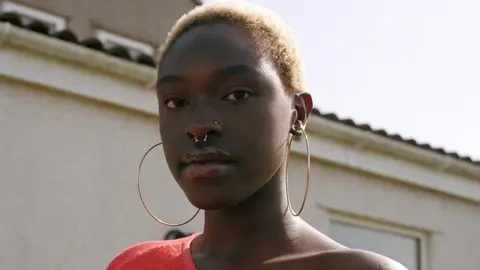 Dean Davis
Dean DavisLiza Bilal, 21, one of the organisers of the city's protest, has pledged to lobby the government into reviewing positive discrimination under the Equality Act.
She said: "It is so companies are actively hiring, and filling their boards with, black and brown people.
"Martin Luther King said 'protests and riots are the expression of the unheard', so if change doesn't occur and we don't see it soon there will be more protests."
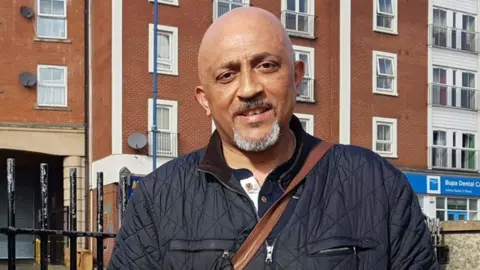 Desmond Brown
Desmond BrownDesmond Brown, chair of the local group of the Lammy Review, investigating racial bias in the criminal justice system, said he had collected data on how decisions were made at each point of a person's journey through the system, to understand where any bias was and then challenge it..
He pledge to create a framework, working with people in independent advisory and community groups, that would see information flow between the community and police so pressing issues could be raised.
And Mr Brown said he would offer workshops to help young black people "survive encounters with the criminal justice system", access help and not become criminalised.
"This is a defining moment and if we don't see change here, I don't think we are going to go back to quiet times," said Mr Brown. "I think the rage in young people across the board, black and white male and female is - enough is enough now."
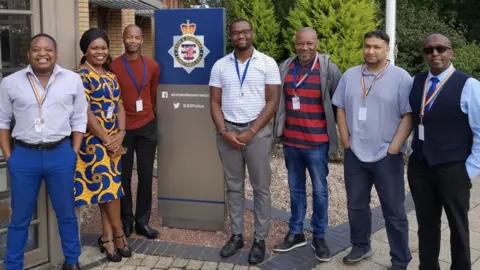 Avon and Somerset Police
Avon and Somerset PoliceA spokeswoman for Avon and Somerset Police's outreach team described an ambitious vision "to be the UK's most inclusive police force".
She said: "We currently don't represent the communities we serve and so this needs to change.
"Our continuing work with the Black Police Association ensures those of a black and minority ethnic background within the service are treated fairly."
The force has been certified by the National Equality Standard and achieved accreditation for best practice in equality, diversity, and inclusion in the workplace.
It has diversity champions who support people from under represented backgrounds who are interested in joining the police.
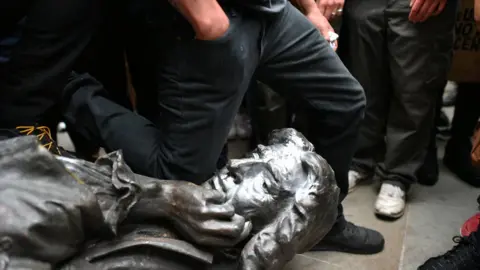 PA Media
PA MediaThe University of Bristol has committed to reviewing the names of its buildings and logo.
A spokesman said: "The Black Lives Matter campaign has served to amplify existing concerns about the university's history and whether we should rename the Wills Memorial Building, and other buildings named after families with links to the slave trade."
